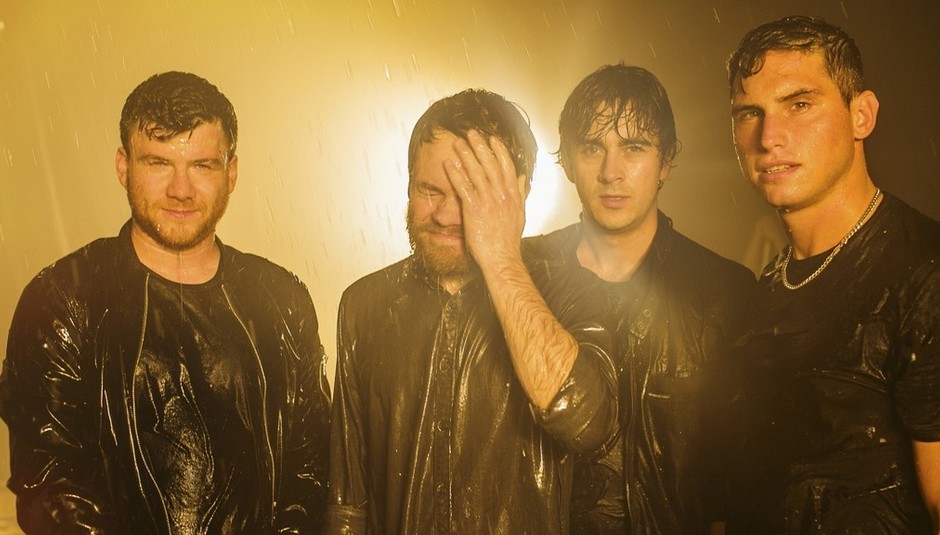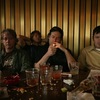Sitting down with Rou Reynolds and Rory Cleclow of Enter Shikari was always going to be an interesting proposition. The band were going through the biggest tour of their career, their first ever solo headline arena tour, with some technology that they’ve never used before and production created entirely by the band. The Mindsweep, their fourth and most recent album, is still fresh in the memory and appears to have catapulted the band to new heights.
It’s not just that though, this band means something to people. How many other bands would you crowd source questions for and the overwhelming majority ask for opinions about the EU referendum?
They’re also approaching the ten year anniversary of their debut album ‘Take to the Skies’, still releasing new material like the recent single Redshift, and appear to have a relatively free Autumn schedule. A new album perhaps?
We were at Victoria Warehouse in Manchester, a venue seldom used for gigs like this, and had a chat with the two members of Enter Shikari. Here’s what happened.
DiS: How are you finding the tour?
Rory: Yeah it’s really good, it’s our first arena headline tour.
Rou: It’s really surreal, there’s been lots of niggling things. By the third show, there was still one or two aspects that weren’t quite right. Hopefully they’re just things that we’ve noticed. Although some kids come to every show so maybe they start to notice. Everything’s going really well now anyway.
Would you attribute those issues to it being your first time in these venues?
Rou: Basically, typically us, or maybe me, I bit off more than I could chew. Or maybe not more than I could chew but my mouth was very full. Doing all the screens and visuals myself, and the quad with Rory and Chris helping with programming, it’s a lot to deal with. Making a whole new set and translating everything to four speakers. It was a lot to get done for that first show and even though we had three production days it just wasn’t enough. They’re all just small things and us being anal perfectionists and wanting to get those final bolts tightened.
Is it important to you that you spend all this time doing the visuals and programming yourselves?
Rou: I think it’s just another side to the art-form. The music is for the ears and this is for the eyes. I don’t want to pay some professional visual artist to do it when he’s not fully connected and involved in the idea of what we’re trying to do. I’m sure that would’ve been fine but I think that way it’s more honest.
Rory: Yeah, it’s all coming from the same place, mentality and creative mindset.
Rou: It’s so fulfilling. Literally the last three months have been spent programming like a 9-9 day job. All them late nights and then you see it on the big screen. It’s awesome.
In the small venues, it’s always seemed like you had arena style production anyway, did you always have these bigger venues in mind?
Rory: We just always try and pack as much visually into our shows as possible. There’s so much going on musically and we want to reflect that and reflect the energy. We always end up spending a large chunk of our fees on production and other things.
Rou: It’s a kids in a sweet shop mentality. You go to these big warehouses and there’s these lights and you’re told they can do this and that and sync them up to the music. And you immediately say ‘argh we can’t not have that, can we find this money in the budget somewhere please?’. We’re not very frugal and prudent when it comes to our money.
There’s an improvised bit on each show at the moment. Is it important to try and keep each performance fresh in some way?
Rou: Because it’s such a structured set and the visuals are in sync with the music, we can’t really change the setlist. So it’s nice to change those little things. Last night in Wrexham, I did a two minute overemotional angry song about how it was supposed to be a day off but we were forced to play this little show. It was fun.
Rory: There’s a lot of mashups between songs as a way to keep it fresh and interesting for us and the audience.
Do you think you have one eye on big festival slots with these shows?
Rou: We’ve never been that band that you see on the front page of Kerrang! saying ‘we’re gonna be the biggest band in the world, we’re gonna take over the world’ and they’re just some completely insignificant metalcore band that everyone has forgotten about two years later. We can be a bit egotistical here and there but with the tongue firmly in cheek. I love playing outside at festivals, there’s something raw and primitive about being outside with a shit-tonne of people.
What have you done to differentiate this tour from the last, other than the visuals?
Rou: I guess the quad is the big thing.
Rory: Probably expanding on that, we’re doing quadraphonic sound, which is basically like surround sound. Did you say this earlier?
Rou: No, I keep doing this. I’m like ‘yeah the quad’ and everyone is like ‘erm…’.
Rory: The quad bike!
Rou: Yes we’ve got quad bikes on stage. It’s quadraphonic sound, which is surround sound basically with two speakers at the back of the room as well as a normal PA at the front.
Rory: While Rou has been working on the visuals, me Chris and Rob have been sitting at home with four sets of speakers going through the electronics and making new bits to send around the room.
Rou: The only person we’ve seen do it is Roger Waters. And that was a good few years ago at Coachella Festival and it just blows us away how much a different experience it is. It’s theatrical and disconcerting with sounds whipping around the room. It’s like ‘fucking hell… what’s going on’. It makes it a completely different experience. It must be tougher at festivals with the wind.
How was the reaction to Redshift when you released that?
Rou: It was really good. We did a cracking video with our boy Mike Tyler which went down really well. This is the thing that really gets me. I was expecting a bigger percentage but there was still people that did the whole ‘oh if this is the new direction then I’m not into it, this is too melodic’. Okay look, if you’re an Enter Shikari fan, by now after four albums of the heaviest music and the most delicate, you know there’s always going to be that range. I couldn’t believe it and I found myself having to bite my tongue at those people. I think it went down well but it’s hard to gauge because we didn’t release a physical copy and nobody really buys music so you have to go off YouTube and Spotify. All the comments back were tip-top.
The song sounds made for big venues. Was that a conscious decision or just the way it happened?
Rou: Some of the riffs have been around for a while but it was written after all The Mindsweep stuff. It wasn’t really with this in mind but it just felt separate from the album and we’ve got another track to release, which is completely the other side of the coin. It still doesn’t have a name.
So it’s not Invincible because I’ve seen that floating on the setlist?
Rou: No that’s something else. Basically, I’ve been doing this piano version of Juggernauts and then it kinda goes into this 90s dance, slightly house, camp interlude. It’s not going to be released.
There’s always singles released between albums. What makes you keep doing that?
Rou: The amount of time between albums is two years minimum with all the touring and you’re going to write songs. To sit on it is very hard. We’re really lucky to be completely independent and just write a song and get it out.
Can you ever see those tracks coming on a compilation?
Rou: Yeah, I think especially for fans getting into our band now who perhaps don’t know about these singles and b-sides.
Rory: It’s actually insane if you look at our Spotify. I don’t actually have all our songs on my iTunes. So whenever we go to play a song live that we haven’t in a while I have to look it up on YouTube and Spotify. That’s my explanation of why I was searching Enter Shikari. I was amazed how many songs we’ve released. It must be 80 or something.
Do you ever sit down and go ‘yeah let’s listen to some Enter Shikari now’?
Rory: No
Rou: I think about doing it if it’s a song that I literally haven’t heard in years. But sometimes you play it back and it can be almost painful because of the nostalgia. It brings back so many memories in such a short span. Sometimes you just wanna let it be. It’s a strange thing.
Obviously there’s loads of plans for now and then the summer but what’s happening in the Autumn?
Rou: Pretty much just starting to write and get our heads down. There’ll be a few tours in places we haven’t played in a while like Australia. We’ve got one track to come but no plans after.
Rory: We’ve been saying for years we should switch up the way we do things with the full length albums and singles and maybe see what happens if we release five songs every year. Then every time album time comes we end up just doing the full album and a few singles. So it’ll probably end up just like that.
Rou: I’d like to record something longer.
Rory: We have material coming out of ears.
Rou: Seeping.
Lots of people asked about your opinions on the EU referendum. How do you feel?
Rou: Oh my god (laughs). I thought most people just die of boredom when this gets brought up. I think generally the outsider, but obvious, point of view is that we should stay in but transform and update it. I think the history of the EU is amazing. To bring together all these countries, fighting for centuries, to make sure it doesn’t happen again is just a beautiful sentiment. It should be remembered and celebrated. There obviously has to be some changes but this mentality of getting out of it because (mock British accent) ‘we’re Britain’ and all this is rubbish. People still think we’re better than other countries or we have a degree of prestige that other countries don’t and it’s so embarrassing.
Rory: Yeah
Rou: I’m proud to be a citizen of the Earth and Europe with its amazing culture and history and I think that should be celebrated.
Do you see that you’ve switched a lot of people onto these issues?
Rou: I usually try lyrically, apart from the odd song like Anaesthetist, to shy away from like party politics and things specific to Britain and be more philosophical and look to the future with wider concept.
Even if not the music though, you’re very vocal online and that attracts people too.
Rou: Yeah and we go around the world and people in Japan and Malaysia and South America are given real energy and positivity from our music and seem really thankful for it. These are people with real struggles. That’s not to say we don’t have struggles in Britain, we do, but it can be quite touching when people are thanking you with tears in their eyes for giving them fuel to carry on with activism.
Can you see any anniversary shows for Take to the Skies?
Rou: I think I’d like to at some point. It is a bit of cliche isn’t it, though? Everyone does that. So we’d have to think about doing something that’s ours. There’s a lot of songs on that we don’t play. We’ve never played ‘Today Won’t Go Down in History’ or even practiced it. We’d love to play that at some point.
Share This Article on Twitter
Never meet your heroes. Unless they happen to be awesome. My interview with @ENTERSHIKARI https://t.co/36JXtCtsuN pic.twitter.com/YVV6u0r76V
— Luke Beardsworth (@LukeBeardsworth) March 16, 2016
For live dates and more info visit entershikari.com
Photo by Tom Martin.






















